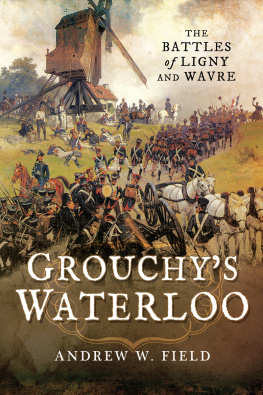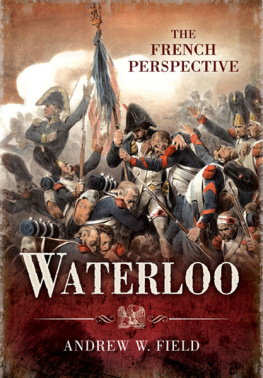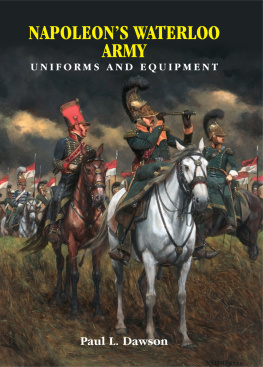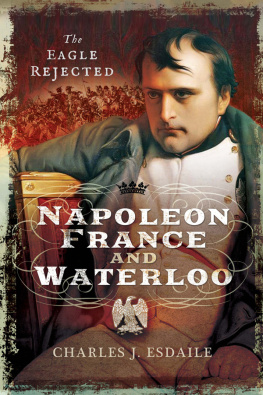
Grouchys Waterloo
Grouchys Waterloo
The Battles of Ligny and Wavre
ANDREW W. FIELD
First published in Great Britain in 2017 by
Pen and Sword Military
an imprint of
Pen and Sword Books Ltd
47 Church Street
Barnsley
South Yorkshire S70 2AS
Copyright Andrew W. Field, 2017
ISBN 978 147385 652 3
eISBN 978 147385 653 0
Mobi ISBN 978 147385 654 7
The right of Andrew W. Field to be identified as the author of this work has been asserted by him in accordance with the Copyright, Designs and Patents Act 1988.
A CIP record for this book is available from the British Library
All rights reserved. No part of this book may be reproduced or transmitted in any form or by any means, electronic or mechanical including photocopying, recording, or by any information storage and retrieval system without permission from the Publisher in writing.
Typeset in Ehrhardt by Chic Graphics
Pen & Sword Books Ltd incorporates the imprints of Pen & Sword Archaeology, Atlas, Aviation, Battleground, Discovery, Family History, History, Maritime, Military, Naval, Politics, Railways, Select, Social History, Transport, True Crime, Claymore Press, Frontline Books, Leo Cooper, Praetorian Press, Remember When, Seaforth Publishing and Wharncliffe.
For a complete list of Pen and Sword titles please contact
Pen and Sword Books Limited
47 Church Street, Barnsley, South Yorkshire, S70 2AS, England
E-mail: enquiries@pen-and-sword.co.uk
Website: www.pen-and-sword.co.uk
List of Maps
Map 1: Campaign map
Map 2: Morning, 15 June
Map 3: Afternoon, 15 June
Map 4: Morning, 16 June
Map 5: Morning, 16 June (2)
Map 6: St. Amand
Map 7: Pajol and Namur
Map 8: Afternoon, 17 June
Map 9: Morning, 18 June
Map 10: Morning, 18 June (2)
Map 11: Wavre, 18 and 19 June
List of Plates
Colour
The Combat at Gilly.
The Battle of Ligny, 16 June 1815: Initial Deployment.
The Battle of Ligny.
The Battle of Wavre, 18 and 18 June 1816.
The Battle of Wavre.
Black & White
The Emperor Napoleon.
Marshal Grouchy.
Marshal Soult.
General Vandamme.
General Grard.
General Pajol.
General Exelmans.
General dErlon.
General Girard.
General Letort.
General Bourmont.
General Subervie.
General Domon.
General Habert.
General Berthzne.
General Vichery.
Field Marshal Blcher.
General von Thielemann.
A modern photo of the Naveau mill.
The farm den Haut today.
The farm of den Bas.
The farm at Walhain where Grouchy famously ate his strawberries.
The Dyle river.
The farm of la Bourse.
A print of the battle of Ligny.
An old print of the Bridge of Christ at Wavre.
An old map (1769) of the town of Wavre.
Ask one hundred Frenchmen; who was Grouchy?
At least sixty would reply, A general who betrayed Napoleon at Waterloo. Why? Because in France, any lost game, political or military, requires one or more traitors and a scapegoat.
Commandant Henry Lachouque, Le Secret de Waterloo .
It is obvious that Providence had condemned us and that it had chosen Marshal Grouchy to punish us!
M.A. Thiers, Waterloo .
The loss of the battle first lies mainly of the great lethargy of Grouchy and his failure to execute my orders.
I would have won that battle without the imbecility of Grouchy.
Napoleon to Barry OMeara on St Helena.
Introduction
This book is not specifically about the battle of Waterloo, perhaps the most writtenabout battle in history. It is about some of the other actors and actions of the Waterloo campaign which led to Napoleons devastating defeat at that battle.
The book continues my planned series covering the whole of the Waterloo campaign written primarily from the French perspective with the aim of balancing the overwhelming number of Anglo-centric accounts. This edition complements my two previous volumes, Waterloo, The French Perspective and Prelude to Waterloo; Quatre Bras . All three books draw heavily on French documents, official reports, primarily eyewitness accounts and memoirs of French soldiers and officers, many of which have not been previously available in English. The aim has not just been to give an account of the campaign through the eyes of the French military, but also to analyse the performance of the key French commanders.
My book on Quatre Bras looked at Marshal Neys performance in detail and analysed to what extent Napoleons criticisms of him were justified. It also explored the extent to which Napoleon himself was to blame. In this book, I will look at the performance of Marshal Grouchy and the armys right wing that he commanded, by following its marches and actions. Having been sent by Napoleon to pursue the Prussian army, defeated by the emperor at the battle of Ligny, Grouchys actions and decisions have been the subject of intense scrutiny by French military historians and critics ever since.
This book is not primarily a critical analysis of Grouchys part in the campaign. My main aim has been to provide as accurate a picture of what actually happened as possible, basing my narrative on the accounts of those who were there. First-hand accounts must always be treated with some suspicion as there are many reasons why they may not be wholly accurate; a personal grudge against one or other of the major participants, a faulty memory for those that wrote later in life, a need to enhance a personal reputation, jingoism or to support the position of another. Certainly many, if not all, writers in this drama are guilty of one or more of these crimes. Despite this health warning, the accounts do agree on much detail and start to contradict each other only where the main controversies arise. I have tried to keep the more detailed discussion on these key controversies to a chapter at the end of the book so as not to interrupt the flow of the narrative too much.
Although it is common knowledge that Grouchy did not fight at Waterloo, it is to his newest marshal that Napoleon attributes his defeat by his failure to arrive
The scale of Frances humiliation, and Napoleons in particular, has inevitably been the topic of many books and polarised French popular opinion into two distinct groups; those anti-Bonapartists who exclusively blamed Napoleon for the defeat and those many supporters of Napoleon who were prepared to blame anyone but him for the catastrophe. The restoration of the Bourbon monarchy after Napoleons second abdication inevitably generated a climate which did not encourage the publication of memoirs and accounts of the campaign by those who took part in it. Ironically, therefore, it was Napoleon, unrestrained by this reticence in his exile on St Helena, who was first This book, written by General Gourgaud, Napoleons senior officier dordonnance during the campaign, is widely accepted to have been either dictated by Napoleon or (more likely) based on the conversations these two had during their exile on St Helena. The reaction to this book was predictable, not least because Napoleon blames his two key lieutenants during the campaign, Grouchy and Ney, for the defeat.
Grouchy and his family were certainly prolific writers on this campaign. Their aim was to try and restore a reputation that had been tarnished by the two accounts dictated by Napoleon in exile on St Helena and subsequent writings of other historians and critics, based on those accounts. Napoleons criticism had clearly cut deeply, and this criticism was repeated in the many accounts by the emperors admirers and apologists that followed. Thus many officers that fought in the campaign were quick to take up Napoleons criticism of Grouchy (and Ney) and to weave them into their own works. Thus the image of Grouchy being responsible for the defeat was reinforced.
Next page










